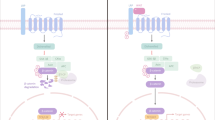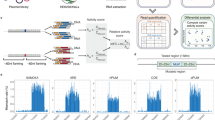Abstract
The canonical Wnt signalling pathway plays a key role during embryogenesis and defects in this pathway have been implicated in the pathogenesis of various types of tumours, including breast cancer. The gene for secreted frizzled-related protein 1 (SFRP1) encodes a soluble Wnt antagonist and is located in a chromosomal region (8p22–p12) that is often deleted in breast cancer. In colon, lung, bladder and ovarian cancer SFRP1 expression is frequently inactivated by promoter methylation. We have previously shown that loss of SFRP1 protein expression is a common event in breast tumours that is associated with poor overall survival in patients with early breast cancer. To investigate the cause of SFRP1 loss in breast cancer, we performed mutation, methylation and expression analysis in human primary breast tumours and breast cell lines. No SFRP1 gene mutations were detected. However, promoter methylation of SFRP1 was frequently observed in both primary breast cancer (61%, n=130) and cell lines analysed by methylation-specific polymerase chain reaction (MSP). We found a tight correlation (P<0.001) between methylation and loss of SFRP1 expression in primary breast cancer tissue. SFRP1 expression was restored after treatment of tumour cell lines with the demethylating agent 5-aza-2′-deoxycytidine. Most interestingly, SFRP1 promoter methylation was an independent factor for adverse patient survival in Kaplan–Meier analysis. Our results indicate that promoter hypermethylation is the predominant mechanism of SFRP1 gene silencing in human breast cancer and that SFRP1 gene inactivation in breast cancer is associated with unfavourable prognosis.
This is a preview of subscription content, access via your institution
Access options
Subscribe to this journal
Receive 50 print issues and online access
$259.00 per year
only $5.18 per issue
Buy this article
- Purchase on Springer Link
- Instant access to full article PDF
Prices may be subject to local taxes which are calculated during checkout






Similar content being viewed by others
Accession codes
References
Bafico A, Gazit A, Pramila T, Finch PW, Yaniv A, Aaronson SA . (1999). J Biol Chem 274: 6180–6187.
Behrens J, von Kries JP, Kuhl M, Bruhn L, Wedlich D, Grosschedl R et al. (1996). Nature 382: 638–642.
Brown AM . (2001). Breast Cancer Res 3: 351–355.
Cadigan KM, Nusse R . (1997). Genes Dev 11: 3286–3305.
Caldwell GM, Jones C, Gensberg K, Jan S, Hardy RG, Byrd P et al. (2004). Cancer Res 64: 883–888.
Costa FF, Verbisck NV, Salim AC, Ierardi DF, Pires LC, Sasahara RM et al. (2004). Oncogene 23: 1481–1488.
Dahl E, Sadr-Nabavi A, Klopocki E, Betz B, Grube S, Kreutzfeld R et al. (2005). J Pathol 205: 21–28.
Egger G, Liang G, Aparicio A, Jones PA . (2004). Nature 429: 457–463.
Esteller M, Gaidano G, Goodman SN, Zagonel V, Capello D, Botto B et al. (2002). J Natl Cancer Inst 94: 26–32.
Esteller M, Hamilton SR, Burger PC, Baylin SB, Herman JG . (1999). Cancer Res 59: 793–797.
Finch PW, He X, Kelley MJ, Uren A, Schaudies RP, Popescu NC et al. (1997). Proc Natl Acad Sci USA 94: 6770–6775.
Fink L, Seeger W, Ermert L, Hanze J, Stahl U, Grimminger F et al. (1998). Nat Med 4: 1329–1333.
Fukui T, Kondo M, Ito G, Maeda O, Sato N, Yoshioka H et al. (2005). Oncogene 24: 6323–6327.
He TC, Sparks AB, Rago C, Hermeking H, Zawel L, da Costa LT et al. (1998). Science 281: 1509–1512.
Herman JG, Baylin SB . (2003). N Engl J Med 349: 2042–2054.
Herman JG, Graff JR, Myohanen S, Nelkin BD, Baylin SB . (1996). Proc Natl Acad Sci USA 93: 9821–9826.
Klopocki E, Kristiansen G, Wild PJ, Klaman I, Castanos-Velez E, Singer G et al. (2004). Int J Oncol 25: 641–649.
Lai J, Flanagan J, Phillips WA, Chenevix-Trench G, Arnold J . (2003). Br J Cancer 88: 270–276.
Lee AY, He B, You L, Dadfarmay S, Xu Z, Mazieres J et al. (2004). Oncogene 23: 6672–6676.
Lin SY, Xia W, Wang JC, Kwong KY, Spohn B, Wen Y et al. (2000). Proc Natl Acad Sci USA 97: 4262–4266.
Lodygin D, Epanchintsev A, Menssen A, Diebold J, Hermeking H . (2005). Cancer Res 65: 4218–4227.
Mann B, Gelos M, Siedow A, Hanski ML, Gratchev A, Ilyas M et al. (1999). Proc Natl Acad Sci USA 96: 1603–1608.
Marsit CJ, Karagas MR, Andrew A, Liu M, Danaee H, Schned AR et al. (2005). Cancer Res 65: 7081–7085.
Niederacher D, Picard F, van Roeyen C, An HX, Bender HG, Beckmann MW . (1997). Genes Chromosomes Cancer 18: 181–192.
Oshiro MM, Kim CJ, Wozniak RJ, Junk DJ, Munoz-Rodriguez JL, Burr JA et al. (2005). Breast Cancer Res 7: R669–80.
Polakis P . (2000). Genes Dev 14: 1837–1851.
Remmele W, Stegner HE . (1987). Der Pathol 8: 138–140.
Seitz S, Rohde K, Bender E, Nothnagel A, Kolble K, Schlag PM et al. (1997). Oncogene 14: 741–743.
Stoehr R, Wissmann C, Suzuki H, Knuechel R, Krieg RC, Klopocki E et al. (2004). Lab Invest 84: 465–478.
Suzuki H, Gabrielson E, Chen W, Anbazhagan R, van Engeland M, Weijenberg MP et al. (2002). Nat Genet 31: 141–149.
Suzuki H, Watkins DN, Jair KW, Schuebel KE, Markowitz SD, Chen WD et al. (2004). Nat Genet 36: 417–422.
Takada T, Yagi Y, Maekita T, Imura M, Nakagawa S, Tsao SW et al. (2004). Cancer Sci 95: 741–744.
Tetsu O, McCormick F . (1999). Nature 398: 422–426.
Tsukamoto AS, Grosschedl R, Guzman RC, Parslow T, Varmus HE . (1988). Cell 55: 619–625.
Ugolini F, Adelaide J, Charafe-Jauffret E, Nguyen C, Jacquemier J, Jordan B et al. (1999). Oncogene 18: 1903–1910.
Ugolini F, Charafe-Jauffret E, Bardou VJ, Geneix J, Adelaide J, Labat-Moleur F et al. (2001). Oncogene 20: 5810–5817.
Uren A, Reichsman F, Anest V, Taylor WG, Muraiso K, Bottaro DP et al. (2000). J Biol Chem 275: 4374–4382.
Varga AE, Stourman NV, Zheng Q, Safina AF, Quan L, Li X et al. (2005). Oncogene 24: 5043–5052.
Waki T, Tamura G, Sato M, Motoyama T . (2003). Oncogene 22: 4128–4133.
Yokota T, Yoshimoto M, Akiyama F, Sakamoto G, Kasumi F, Nakamura Y et al. (1999). Cancer 85: 447–452.
Acknowledgements
The technical assistance of Sonja von Serenyi, Sevim Alkaya and Inge Losen is greatly appreciated. The study was supported by the German Ministry for Education and Research (BMBF Grant 01KW0404) as part of the German Human Genome Project (DHGP) and a grant from the RWTH Aachen (START program).
Author information
Authors and Affiliations
Corresponding author
Rights and permissions
About this article
Cite this article
Veeck, J., Niederacher, D., An, H. et al. Aberrant methylation of the Wnt antagonist SFRP1 in breast cancer is associated with unfavourable prognosis. Oncogene 25, 3479–3488 (2006). https://doi.org/10.1038/sj.onc.1209386
Received:
Revised:
Accepted:
Published:
Issue Date:
DOI: https://doi.org/10.1038/sj.onc.1209386
Keywords
This article is cited by
-
SFRP1 Expression is Inversely Associated With Metastasis Formation in Canine Mammary Tumours
Journal of Mammary Gland Biology and Neoplasia (2023)
-
Functional regulations between genetic alteration-driven genes and drug target genes acting as prognostic biomarkers in breast cancer
Scientific Reports (2022)
-
Wnt signaling in breast cancer: biological mechanisms, challenges and opportunities
Molecular Cancer (2020)
-
Nanoparticles for Manipulation of the Developmental Wnt, Hedgehog, and Notch Signaling Pathways in Cancer
Annals of Biomedical Engineering (2020)
-
Potential biomarkers of ductal carcinoma in situ progression
BMC Cancer (2020)



